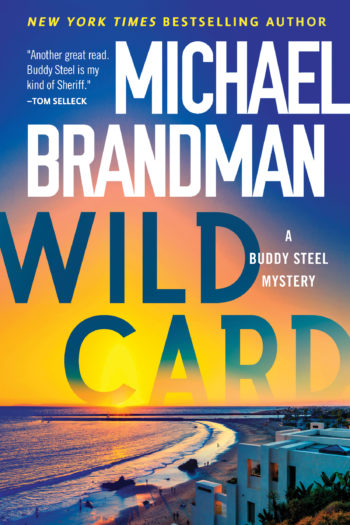.jpg) Michael Brandman wrote three Jesse Stone novels following the death of Robert B. Parker in 2010, all of which became New York Times bestsellers. With his longtime partner, Tom Selleck, he produced and co-wrote nine Jesse Stone movies and three westerns. His latest book, WILD CARD, is the third installment in his Buddy Steel series of mysteries (following MISSING PERSONS and ONE ON ONE). In this amusing essay, Brandman recalls his first meeting with Parker, some of their subsequent film and television collaborations, and Parker’s memorable cameo appearance in Small Vices, a Spenser movie starring Joe Mantegna.
Michael Brandman wrote three Jesse Stone novels following the death of Robert B. Parker in 2010, all of which became New York Times bestsellers. With his longtime partner, Tom Selleck, he produced and co-wrote nine Jesse Stone movies and three westerns. His latest book, WILD CARD, is the third installment in his Buddy Steel series of mysteries (following MISSING PERSONS and ONE ON ONE). In this amusing essay, Brandman recalls his first meeting with Parker, some of their subsequent film and television collaborations, and Parker’s memorable cameo appearance in Small Vices, a Spenser movie starring Joe Mantegna.
Robert B. Parker and I first met in Los Angeles. Although an inveterate Hollywood devotee, at the time of our meeting Bob was disenchanted. This was following the three-season ABC-TV run of the “Spenser for Hire” series, for which Bob had nothing but scorn. He was embittered because, in his words, "Urich never bothered to read even a single Spenser novel." Which Bob took as a repudiation of his literary prowess.
Our initial meeting had been great fun. Bob's agent had arranged for us to lunch together at The Westwood Marquis. We met at noon, Bob’s wife Joan joined us at 2, and at 3:30 they chased us out of the restaurant because they had to set up for dinner.
A huge fan of westerns, Bob had seen my production of Elmore Leonard's Last Stand at Saber River starring Tom Selleck and had greatly admired it. As a result, we joined forces and together did an un-billed polish of Tom's and my second western, Louis L'Amour's Crossfire Trail. That was followed by our adaptation of Jack Schaeffer's western Monte Walsh, also starring Tom Selleck. This time we got full credit.
 Then there was the time we had dinner in Toronto at the Ritz-Carlton Hotel. Bob and Joan had driven up from Boston. The focus of our conversation was centered on Bob's acting debut, which was to take place the next day. We were filming his novel, SMALL VICES, a Spenser movie starring Joe Mantegna, who had read all of the books and loved them.
Then there was the time we had dinner in Toronto at the Ritz-Carlton Hotel. Bob and Joan had driven up from Boston. The focus of our conversation was centered on Bob's acting debut, which was to take place the next day. We were filming his novel, SMALL VICES, a Spenser movie starring Joe Mantegna, who had read all of the books and loved them.
Ever since we had been picked up for production by the A&E Network, Bob had been actively campaigning to play a role in the movie. Begging, actually. He promised to write a colorful character suitable for his prodigious talent.
Admittedly Bob was a ham. He'd often pepper his monologues with strange accents and frequently broke into song. He claimed he was far better looking than Tom Selleck. He promised that, were he cast in the movie, he'd surely garner an Emmy nomination.
Needless to say, he got the part. Bob created the role of Ives, a shadowy international spy. Ives would meet with Spenser in a dark and dreary parking garage, which allowed him to duck in and out of the light. "Ives," he would bellow by way of self-introduction.
In the Ritz-Carlton dining room, where Bob frequently referred to me as “Mr. Big Time Hollywood Producer,” he seriously discussed his make-up and wardrobe needs. Bob now fancied himself as Sydney Greenstreet in The Maltese Falcon. He was greatly amused when the waiter took my credit card, misread it and called me Mr. Breadmar.
Although Bob was a tad nervous, the next day's shoot went splendidly, and his performance was interesting and disarming. Alas, to his great disappointment, Bob never did receive an Emmy nomination.
We made two more Spenser movies for A&E, and Bob insisted on performing cameos in each of them, Alfred Hitchcock-style. In one he was a janitor, furiously mopping the lobby of an otherwise deserted school auditorium. In the other, he was a uniformed desk sergeant, performing his duties while brandishing a smarmy smirk.
Those cameos marked the end of Bob's acting career. He turned down all other entreaties. But from then on, whenever he phoned, Bob would always declaim, "It's Ives for Mr. Breadmar."


